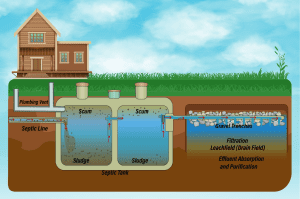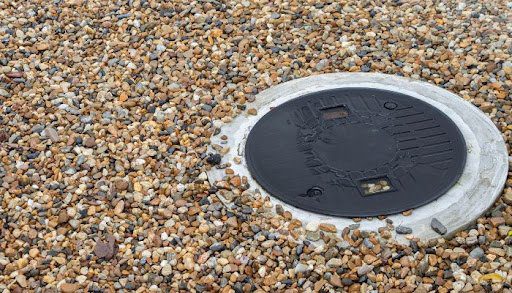Quick Fixes for Common Septic Issues
Septic systems require regular maintenance, and occasional issues are almost inevitable. When minor problems arise, addressing them quickly can prevent more significant repairs and ensure your system runs efficiently. This guide covers some of the most common septic issues and provides quick, effective solutions for each.
Understanding Your Septic System
How Septic Systems Work
A septic system collects and treats wastewater through a septic tank and drain field. Solids settle in the tank, while liquids flow into the drain field, where they filter naturally. Over time, solids build up, making routine maintenance essential for preventing backups, clogs, and other issues.
Why Septic System Issues Occur
Common septic problems often result from improper maintenance, overloading the system, or flushing unsuitable materials. Understanding the causes of these issues is the first step toward finding quick and effective solutions.
Common Septic Issues and Quick Fixes
1. Slow Drains
Slow drains are a common issue that can indicate a full tank, clog, or buildup in the system.
– **Quick Fixes:**
– Start by checking individual drains to see if a localized clog exists. Use a plunger or plumber’s snake on sinks, showers, and toilets to remove minor clogs.
– Avoid chemical drain cleaners, as they can harm the bacteria in your septic tank.
– If all drains are slow, it may indicate that the septic tank is full. In this case, scheduling a tank pumping is the best solution.
2. Foul Odors Indoors or Outdoors
Foul odors can come from the septic tank, plumbing vents, or drain field and may indicate a leak, clog, or full tank.
– **Quick Fixes:**
– If odors are inside the house, pour a half cup of baking soda down each drain weekly to help neutralize odors and maintain pH balance.
– Check your vent pipes for obstructions (such as leaves or debris) that may be causing odors to back up indoors. Clear any blockages carefully.
– If the odor persists, it could indicate that the septic tank needs pumping or that there’s a leak in the system, which may require professional attention.
3. Sewage Backups in the House
A sewage backup is one of the most serious septic issues, indicating a blockage or an overflowing tank.
– **Quick Fixes:**
– First, turn off water usage to prevent further backups.
– If only one drain or toilet is backing up, use a plunger to attempt clearing the blockage. For toilets, a plumbing snake can also help.
– If multiple fixtures are backing up, the septic tank may be full, or there may be a blockage in the main line. In this case, contact a septic professional to diagnose and resolve the issue.
4. Pooling Water or Soggy Spots in the Yard
If you notice standing water or soggy areas near the drain field, it may indicate that the drain field is failing or that the system is overloaded.
– **Quick Fixes:**
– Check your household water usage. Reduce water consumption by spacing out laundry loads and showers to avoid overloading the system.
– Divert downspouts and other surface water sources away from the drain field to reduce flooding.
– Pooling water can also be a sign of a clogged drain field. You may need a septic professional to flush or replace the affected area.
5. Toilet Flushing Issues
When toilets are slow to flush or don’t flush fully, it may indicate a blockage or an issue with the septic system.
– **Quick Fixes:**
– Use a plunger to attempt clearing the blockage.
– If you notice gurgling sounds in the drains or a consistently slow flush, it may be time to pump the septic tank. These symptoms can indicate that the tank is full and needs attention.
Preventative Tips for Avoiding Common Septic Issues
Limit Water Usage

Excessive water usage can overload your septic system, leading to backups and drain field issues. Spread out water-intensive tasks, like laundry and dishwashing, to reduce the load on your septic system.
Avoid Flushing Inappropriate Items
Flushing anything other than septic-safe toilet paper can lead to clogs and backups. Avoid flushing wipes, feminine hygiene products, and paper towels, as these materials do not break down easily and can cause major issues.
Use Septic-Safe Cleaning Products
Harsh chemicals and antibacterial soaps can harm the beneficial bacteria in your septic tank, leading to a decrease in the tank’s effectiveness. Use septic-safe cleaning products to protect your system.
Schedule Regular Septic Tank Pumping
Pumping your septic tank every 3-5 years is essential to prevent solids from building up and causing clogs or overflows. This simple maintenance step can save you from costly repairs down the line.
When to Call a Professional for Septic Issues
While many septic issues can be addressed with quick fixes, some situations require professional assistance. Here’s when to call in a septic expert:
Persistent Sewage Odors
If you continue to smell sewage odors after attempting basic fixes, it’s best to call a professional. Persistent odors could indicate a serious issue, such as a leak or a failing drain field.
Severe Sewage Backups
A significant sewage backup affecting multiple fixtures in your home may be due to a full tank or a severe blockage in the main line. In this case, a septic professional can safely diagnose and resolve the issue.
Frequent Pooling in the Yard
If you’re seeing frequent pooling water near the drain field, it may indicate that the drain field has failed. This problem usually requires specialized equipment and expertise to repair.
Drain Field Replacement
Drain fields don’t last forever, and if yours is showing signs of failure (such as constant wet patches or sewage smells), it may need replacement. Only a professional can assess and carry out this level of repair effectively.
Final Tips for Maintaining Your Septic System
Taking proactive steps can go a long way in keeping your septic system functioning properly. Here are some final tips to remember:
– **Keep a Maintenance Schedule:** Regularly schedule pumping and inspections to catch small issues before they become major problems.
– **Educate Household Members:** Ensure everyone in your home knows what should and shouldn’t go down the drain.
– **Consider Installing Alarms:** Septic tank alarms can alert you to high water levels or other issues, allowing you to address them quickly.
Conclusion
Septic issues are common but can often be managed with a few quick fixes and preventative care. By understanding how to address minor problems and knowing when to call a professional, you can keep your septic system in optimal condition, saving time and money in the long run. Implementing these tips will help ensure your septic system remains a reliable and efficient part of your home’s infrastructure.

